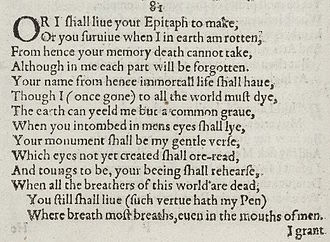Sonnet 81
Q1
Q2
Q3
C
Or I shall live your epitaph to make,
Or you survive when I in earth am rotten;
From hence your memory death cannot take,
Although in me each part will be forgotten.
Your name from hence immortal life shall have,
Though I, once gone, to all the world must die:
The earth can yield me but a common grave,
When you entombed in men’s eyes shall lie.
Your monument shall be my gentle verse,
Which eyes not yet created shall o’er-read;
And tongues to be your being shall rehearse,
When all the breathers of this world are dead;
You still shall live—such virtue hath my pen—
Where breath most breathes, even in the mouths of men.
4
8
12
14
Sonnet 81 is one of the 154 sonnets written by William Shakespeare, which were published in a quarto titled Shakespeare's Sonnets in 1609. It is a part of the Fair Youth series of sonnets, and the fourth sonnet of the Rival Poet subsequence.
Sonnet 81 is an English or Shakespearean sonnet. The English sonnet has three quatrains, followed by a final rhyming couplet. It follows the typical rhyme scheme of the form, abab cdcd efef gg and is composed in iambic pentameter, a type of poetic metre based on five pairs of metrically weak/strong syllabic positions. The 5th line exemplifies a regular iambic pentameter:
The 2nd and 4th lines feature a final extrametrical syllable or feminine ending:
The meter demands a few variant pronunciations: line 8's "entombèd" is pronounced as 3 syllables, and line 14's "even" as 1.
There are many theories to the identity of the young man. Shakespeare's one-time patron, Henry Wriothesley, 3rd Earl of Southampton is a potential fit, as is Shakespeare's later patron, William Herbert, 3rd Earl of Pembroke.
...
Wikipedia

